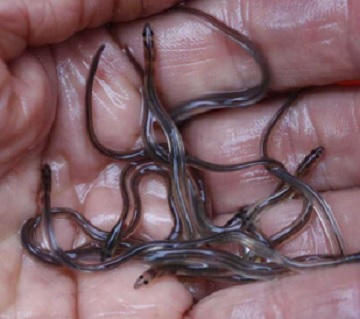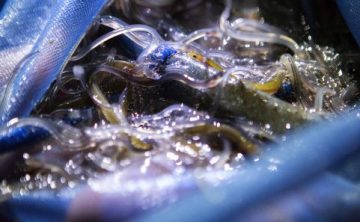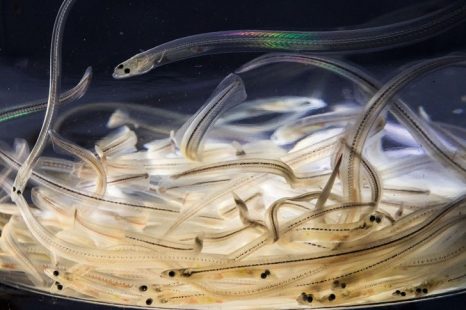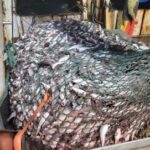Tag Archives: Baby eels
“A bucket and a net, and you’re in business.” Looming tensions in Maritime eel fishery
 Commercial harvesters of baby eels in the Maritimes say there’s little hope the poaching and violence that forced the closure of the lucrative fishery last season will subside in 2024. The federal Department of Fisheries and Oceans closed the fishery for the tiny, translucent fish known as elvers on April 15 after reports of violence related to unauthorized fishing. There were accusations of assault and even shots fired along coastal rivers in parts of Nova Scotia and New Brunswick. The increased illegal activity comes as demand grows for the young eels, which are sold live to aquaculture operations in Asian markets such as China and Japan, where they are grown for food. Prices had reached as high as $5,000 per kilogram in 2022, partly because sources for the fish species in Europe and Asia had begun to dry up. more, >>click to read<< 06:02
Commercial harvesters of baby eels in the Maritimes say there’s little hope the poaching and violence that forced the closure of the lucrative fishery last season will subside in 2024. The federal Department of Fisheries and Oceans closed the fishery for the tiny, translucent fish known as elvers on April 15 after reports of violence related to unauthorized fishing. There were accusations of assault and even shots fired along coastal rivers in parts of Nova Scotia and New Brunswick. The increased illegal activity comes as demand grows for the young eels, which are sold live to aquaculture operations in Asian markets such as China and Japan, where they are grown for food. Prices had reached as high as $5,000 per kilogram in 2022, partly because sources for the fish species in Europe and Asia had begun to dry up. more, >>click to read<< 06:02

Baby eels remain one of America’s most valuable fish after strong year in Maine
Baby eels, called elvers, are often worth more than $2,000 per pound because of how valuable they are to Asian aquaculture companies. That makes them one of the most valuable fish species in the U.S. They’re raised to maturity so they can be used in Japanese food, some of which is sold in the U.S. in unagi dishes at sushi restaurants. The elvers have again been worth more than $2,000 per pound at the docks this year, according to the Maine Department of Marine Resources. South Carolina is the only other state in the country with a fishing industry for baby eels, and that state’s fishery is much smaller. >click to read< 09:12

Maine men sentenced to probation, fines for trafficking baby eels
Two Maine men were sentenced Thursday to serve federal probation and to pay fines for their roles in an interstate baby eel trafficking ring. Michael Squillace, 40, of Woolwich, and John Pinkham, 51, of Bath, each pleaded guilty last summer to trafficking in hundreds of thousands of dollars worth of illegally harvested baby eels, or elvers. They are among 19 men charged in federal court in three different states with illegally catching, selling and transporting more,,, >click to read< 21:00

Inside the Multi-million-Dollar World of Eel Trafficking
The alleged kingpin of one of the biggest domestic wildlife smuggling operations ever to hit the East Coast is exactly where you’d expect to find him on a rainy evening in early May: firmly planted in a swivel chair at a big green metal desk inside his renovated Quonset hut on Foster Street, in Ellsworth, Maine. At this post Bill Sheldon waits day and night for fishermen to come and fill his bowl with writhing masses of baby eels. The 72-year-old fisherman wears glasses, a blue flannel shirt, jeans, duck boots, and a brown L.L. Bean baseball cap. His cell phone goes quack, quack, quack when it rings. The sign above his head reads, “Buying Glass Eels Here,” with the day’s market price: $1,250 per pound. (so much more about the fishery in this article than “trafficking”) click here to read the story 09:26

Maine’s latest fishing frenzy brings in $1,200 a pound — and it’s not lobster
It is just past midnight, rain clouds stalking a full moon, and Julie Keene is out on a muddy riverbank in thigh-high rubber boots and a camouflage jacket, a headlamp strapped over her hair. As she wrestles with an oversize fishing net, Keene tells how she went from rags to riches, and that’s not a story many fishermen tell. Just a few years ago, the sardine factory in her hometown of Lubec had closed, and Keene was scrounging for a living digging clams and gathering periwinkles from the beach. “We were so damn poor we were on food stamps,” Keene said.Then came what for Maine was the equivalent of a gold rush. It was slimy, squirmy baby eels — in such demand in Asian markets that they were suddenly more profitable than even the beloved Maine lobster. One memorable night in 2012 when the baby eel were running strong, Keene was paid $36,000 — in cash — for her catch Click here to read the story 10:17
How Does a Four-Inch Eel Hurdle a 40-Foot Greenwich Dam?
 Baby eels are making their annual migration from Long Island Sound to rivers across Connecticut, but along the way, they’re encountering one persistent obstacle: river dams. Now, one man in Greenwich is working to make the eels’ journey a little easier. Read more here wnpr.org 12:27
Baby eels are making their annual migration from Long Island Sound to rivers across Connecticut, but along the way, they’re encountering one persistent obstacle: river dams. Now, one man in Greenwich is working to make the eels’ journey a little easier. Read more here wnpr.org 12:27















































